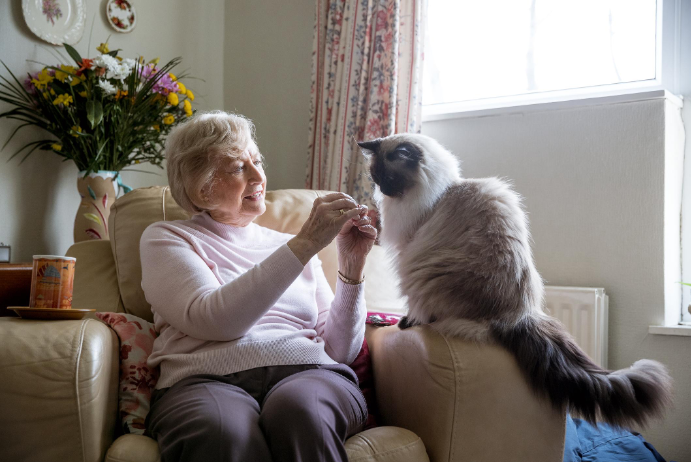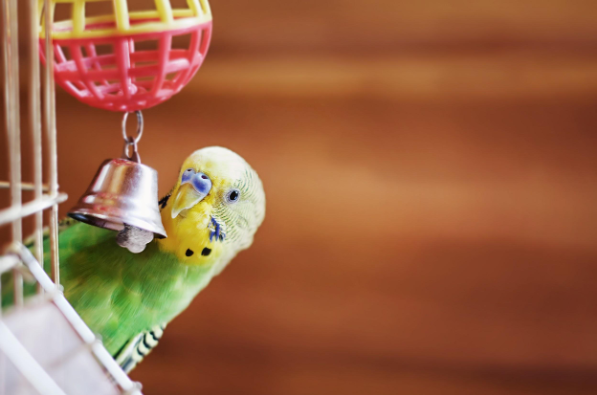Unconditional love. Boosted emotional well-being. Reduced stress. Constant companionship. Lower blood pressure. A sense of purpose. Increased movement. Elevated social interaction. The benefits of having a pet in your life – particularly the benefits of pets for seniors – are indisputable.
Pets for seniors can range anywhere from a lap dog that craves nothing more than belly rubs and ear scratches to tiny colorful birds that fill the day with sweet sounds. Each type of pet comes with its own distinct needs, time, financial commitment and level of energy.
Caring for another living being can be a bright spot in a senior’s daily routine and give them something positive to focus on. However, pet ownership also requires careful consideration.

Pets for Seniors: 5 Factors to Consider
While the list of benefits of pets for seniors is lengthy, keep in mind they’re also a long-term financial and time commitment. Before welcoming a new furry, feathered or finned companion into your life, there are several factors to consider when choosing pets for seniors.
- Energy level and activity requirements: The number of daily walks and potty breaks dogs need varies by breed and personality, so you’ll need to be sure you’re up for the task. If you lead an active lifestyle, a great way to keep you healthy is to choose a dog that needs several walks a day. Do you have limited mobility or other functional limitations? Seniors leading less active lifestyles should consider a lower-energy dog that’s easier to manage and doesn’t require much physical exercise.
- Size: With smaller pooches (or cats, fish or birds) you won’t have to worry about them tugging too hard on a leash or jumping up and knocking you over. Plus, they tend to be some of the best pets for apartments and easier to transport. Additionally, small pets are easier on the wallet because they require less food and have cheaper medical costs. One thing to keep in mind, however, is teacup-sized pups can linger underfoot and might be a tripping hazard.
- Age: Puppies, kittens, hatchling birds and rabbit kits might not be the best pets for seniors because they have higher care needs and require more attention and training. In most cases, older adults should choose a pet that’s more mature. Adopting an older cat or dog from a shelter is a good choice because they’re calmer and often already trained. You’ll feel good knowing you helped give an animal a new home, plus you can spend more of your time relaxing and enjoying their company.
- Community guidelines: Be sure to choose a pet-friendly independent senior living community and do your research on residential guidelines for pets. For example, are there size or breed restrictions? What are the best pets for apartments? Are there areas you can take your pooch for a walk and let him go potty?
- Health and lifespan: Some dog breeds may be more prone to health issues such as back problems, diabetes or incontinence. Keep in mind: Pets are a long-term financial commitment. Be sure to have any pet examined by a vet before taking it home to ensure it’s healthy. You should also consider your pet’s lifespan and have a contingency plan in place for any unforeseen emergencies.

What are the best pets for seniors?
1. Frisky felines
Cats make excellent companions for the elderly. They have distinct personalities, don’t bark and thrive indoors. Plus, they don’t require non-stop attention or daily walks to use the bathroom. Some are vocal with their meows and purrs, while others are independent and standoffish. Some are affectionate and want to spend their days on your lap. In contrast, others are playful and easily entertained by a dangling toy or feather.
Best cat breeds for seniors
Both short and long-haired cats are great options for seniors in search of a feline companion. The Birman and Burmilla are playful, gentle and affectionate breeds. The Ragdoll is laid-back, calm and happy to follow their older companion around the house. British Shorthairs are playful kittens, but mellow out as they age and are content snoozing.
Russian Blue and Scottish cats are low-energy, quiet, but loving, and not looking for any trouble. Persians are sweet, gentle cats that get along with other pets and people, but they aren’t big fans of boisterous children. Both the Scottish (quiet) and Snowshoes (more verbal) breeds are loyal and intelligent.
2. Devoted dogs
There’s a reason why they’re referred to as “man’s best friend.” Dogs for independent living are the perfect companion if you’re looking for a pet to play, snuggle and take daily walks with.

Best dogs for seniors
When you’re ready to consider suitable dogs for independent living, there are a variety of breeds that will fit an elderly pet owner’s bill. All these breeds are fairly low-maintenance and low-energy, plus they’re well-suited in smaller homes and can be picked up or walked safely:
- Gentle and quiet-natured Cavalier King Charles Spaniel
- Cute and lovable Shih Tzus
- Small, but hardy Maltese
- Snub-nosed Pugs
- Personality-packed Boston Terriers
- Intelligent and adaptable Scottish Terriers
- Sleek and sensitive Italian Greyhounds
- Queen of England-loving Pembroke Welsh Corgis
- All the poodles – standard, miniature and toy
3. Feathered friends
Do you enjoy sweet songs and calming vocals in your day? A small bird species can be a delightful addition to your home. They’re fun to watch, are easy to clean up after, don’t require much space and can still thrive with limited interactions.

The best pet birds for seniors
Parakeets (or budgies), canaries and finches may be small in size, yet still can make a big impact on an older adult’s quality of life with their personality and vocals. Parakeets love to socialize and require out-of-cage playtime and interaction, making them best suited for active and mobile seniors. The sweet, soft songs of a canary have a calming effect and they’re fun to watch and easy to care for. Finches don’t require much attention but are sweet, pleasant to listen to and a joy to watch as they flit about.
4. Finny fellows
Fish are low-maintenance, solitary, quiet, inexpensive and don’t take up much space. In other words, they’re the ultimate pet for a senior who wants a no-fuss, yet calming and colorful companion. All you have to do is sit back, relax and watch them as they navigate their underwater abode.
5. Other companion critters
Gentle reptiles like leopard geckos and soft nuzzling rabbits might not be the first pet companion that comes to mind. But they can be well-suited for some seniors. Rabbits don’t make much noise and can use a litter box. While some are happy to sit on your lap and have their fur brushed (think: long-haired angoras), others are perfectly content with attention on their terms. Leopard geckos offer a variety of colors and are well-suited for older adults looking for a small, quiet and low-maintenance pet.
Wondering where to find your new best friend? Animal shelters like the Humane Society of Northern Texas and online adoption services like Petfinder make it easy to discover the perfect pet companion.
And take a moment to learn more about the pet-friendly, independent living lifestyle happening right here at The Stayton of Museum Way – Fort Worth’s only Life Care community.


